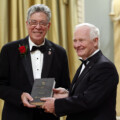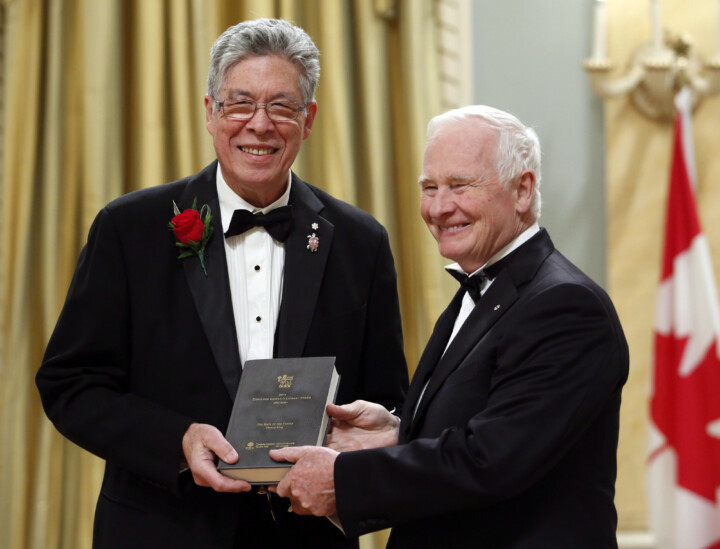The name Norman Tebbit won’t mean much to most Canadians but for those of a certain age who followed British politics in the 1980s, the news of his death last week was an occasion for rejoicing or regret, and not much in between. Tebbit, whom Labour leader Michael Foot famously branded “a semi-house-trained polecat,” was not a man for half measures and his demise will leave few people on the fence about his legacy.
Tebbit was of the aspirational working class, a grammar school boy who never forgot where he came, the hard work it took to get where he ended up, and the forces—closed shops, militant socialists, and Labour governments—who tried to stop him along the way. As employment secretary and then at trade and industry, Margaret Thatcher trusted Tebbit to implement much of what we now call “Thatcherism.”
Today, he is best remembered for two political adages.
In 1981, when unemployed black youth clashed with police in South London, Tebbit recalled his father, who during the Great Depression “didn’t riot.” Instead, “he got on his bike and looked for work and he kept looking ’til he found it.” Popularly condensed to “get on yer bike,” his response was hailed as old-fashioned sense and denounced as racial provocation. Your politics determined your reaction.
His other great adage was also a litmus test, and one with more contemporary relevance. Dubbed the Tebbit Test or the Cricket Test, it’s a simple heuristic for measuring social integration: do immigrants watching cricket cheer for England or for their old home country? As Tebbit explained, the test probes, “Are you still harking back to where you came from or where you are?”
It is fashionable now to decry the Tebbit Test as crude and insensitive. It has even been alleged that Tebbit repudiated it late in life. He didn’t.In an interview when he was 87, Tebbit spoke of English fans cheering for ethnically African or Asian players on English teams, which is a different matter altogether. If not quite the inverse of his original test, it is close: evidence of successful integration. Why would he? He was right to insist that immigration and integration go together. The alternative is slow, then rapid, social disintegration, as we see happening in real time in some English and Canadian cities. The Tebbit Test matters now more than ever.
As someone who has lived for many years in foreign countries, I’ve sometimes imagined myself as a naturalized citizen watching the Canadian Olympic hockey team face off against my new country. Could I cheer against the maple leaf? I don’t think I could shed my inborn allegiance so easily, which is perhaps why I’ve always returned home. But had I formally emigrated, I would have encouraged my children born abroad to cheer for my new country—their home country.
True citizenship is not as simple as acquiring a passport—anyone can be a citizen on paper, as Mark Carney showed when he hastily renounced his British and Irish passports when those citizenships of convenience became politically inconvenient. He could do so because no one, including Carney, believed he was really British or Irish. It was a transactional arrangement, at most a sentimental conceit. He was never a true immigrant or a true citizen of either country.
A country is more than an economic unit, so immigration should never be a purely economic transaction. It is not enough for a newcomer to work and pay taxes (though “on yer bike” remains sound advice for those who don’t). There must be an emotional commitment to the new country and to its ways of life, a decisive and final transfer of affections from the familiar, which must henceforth be foreign, to something only half known, which must be grasped and held as one’s own.
This integration takes time and effort. It requires learning—a new language, history, traditions, habits, and mores—but equally it requires unlearning old ways of thinking, speaking, and acting that are incompatible with the way of life in your new home. We should be patient with newcomers feeling their way in a new culture and a new language, but patience implies progress and an end goal; it is a reciprocal response to effort being made. Where there is no such effort, we owe no patience.
It is natural to remember where you came from or to have an atavistic affection for your parents’ homeland, but at some point a preponderant attachment to foreign affairs and foreign ways is a failure of integration. The blame for that lies both with those who resist assimilation and the country that does not insist on it. Watching the militant demonstrations in our cities, I’m no longer worried that some newcomers wouldn’t cheer for Canada in sports—I’m worried they wouldn’t side with us in a war. We must demand more. We are now the ones being tested.









